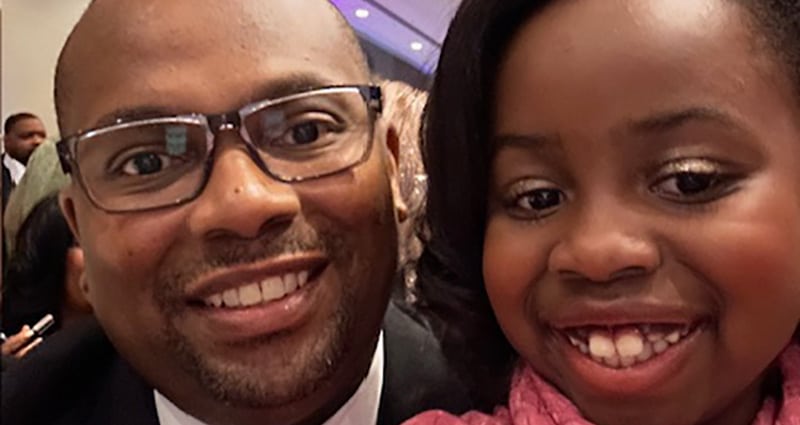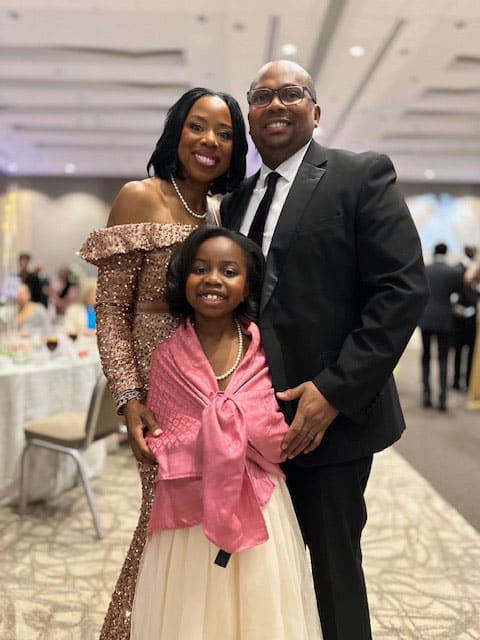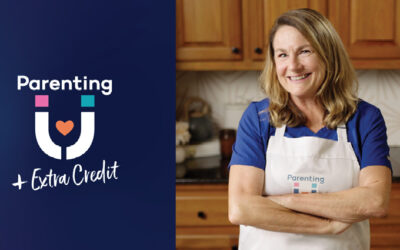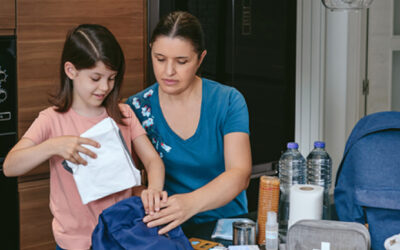Picture a typical Sunday morning in December. A dad is making breakfast for his daughters before his youngest’s final “Mississippi Ballet Nutcracker” performance.
For Ryan McBride, 46, this normal morning routine ended with a medical emergency. Thanks to his daughters’ swift action Ryan was able to get immediate treatment and is recovering from a stroke.
Rachel Elise’s Quick Thinking
As Ryan was preparing breakfast for his 7-year-old, Rachel Elise, at their home in Ridgeland, Mississippi, he noticed his fingers on his right hand and then his right arm started moving involuntarily. Eventually he could no longer hold the syrup to pour on her pancakes.
Rachel Elise recognized the change in her dad and would not let him brush it off.
“She followed me into the dining room, and she said, ‘What is wrong?’” Ryan remembers. Rachel Elise ran to wake up her 14-year-old sister, Riz, and together they called 911.
Ryan’s wife was on a trip, but a neighbor was able to come over and help the girls get him on the ottoman after he lost consciousness. The next thing Ryan remembers is the paramedics coming into their home.
“I remember some of the things they were asking me to do,” he says. “At the time I was unable to talk, my right side was paralyzed and I could not feel my arm.”
Ryan noticed his symptoms around 8 a.m. when he woke up, and by 8:20 he was on his way to the hospital. By 9:30 he was receiving the clot-busting drug tPA (tissue plasminogen activator), which is most effective in the first 4.5 hours of the onset of stroke symptoms.
Expert Care at St. Dominic’s
Ryan was taken to St. Dominic Hospital, where he received excellent care from people he knows. Ryan is physician practice manager at the St. Dominic’s Family Medicine – Dogwood Clinic.
“I think that I got the best care ever, and I attribute my life today to the care, speed and reaction of everyone involved in my care,” Ryan says. “I can’t even describe how it made me feel to know that I was in such good hands from point A to Z.”
Situated in the heart of the stroke belt, St. Dominic’s Comprehensive Stroke Center is uniquely positioned because it offers rapid diagnosis, high-tech intervention, expert care and intensive rehabilitation in a caring, compassionate setting. As a comprehensive stroke center of excellence, St. Dominic Hospital has the highest level of stroke certification available and is the first in Mississippi to earn the designation from The Joint Commission.
Remarkable Recovery
Ryan was discharged from the hospital the following Wednesday afternoon, only a few days after his stroke. Although he was off work until March 8, his colleagues were instrumental in diagnosing the cause of his stroke.
Ryan’s wife, Mona, notified Rebekah Moulder, MD, who practices at the clinic Ryan manages, when he was being transported to the ER via ambulance. Dr. Moulder came to the ER and recommended checking Ryan’s heart, which led to the discovery of a PFO (patent foramen ovale). This hole in the heart usually closes shortly after birth, but in Ryan’s case it did not.
“My cholesterol was good, and my blood pressure is controlled with meds,” Ryan says. “There was no indication that I ever had this PFO.”
Ryan has made changes to his lifestyle, including diet and exercise. “I am more in tune with my body, with knowing what my limitations are,” he says.
Heed Ryan’s Advice
Ryan says everyone – including children – need to know what to do in an emergency.
“The best thing you can do is to get help,” Ryan says. His daughter knew to call 911, and that quick thinking likely saved Ryan’s life.
Riz surprised her dad three weeks ago by coming home with her CPR certification. “I went ahead and did this because I want to be prepared in case something ever happens,” she told him.
Ryan’s story is a testament to the importance of quick thinking and excellent medical care. Understanding what to do when a stroke happens can save lives because time is brain and minutes matter when it comes to stroke.






